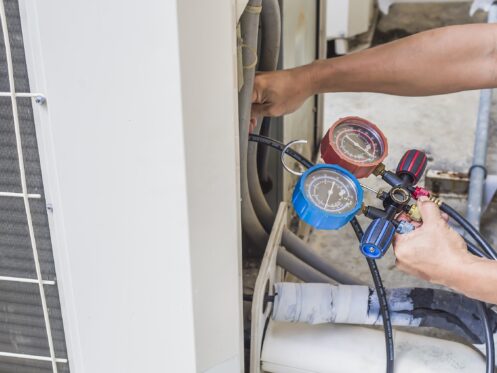As school lets out and the temperatures rise, it’s clear that the summer heat is around the corner. If you’re dreading those costly utility bills, know that there are ways to beat the high summer electric bills. Breathe a little easier with these eight tips.
1. Replace Your Air Filters
Your air filters trap all of the dust, debris, and allergens from circulating in the air. This is an effort to make sure everyone in your household inhales clean air. When you don’t take the time to change your air filters on a specific schedule, you’ll run the risk of triggering allergic reactions and other breathing concerns.
However, as it pertains to keeping your electric bills low, refusing to regularly change your air filters results in making your HVAC system work even harder to push air through your home. The harder the HVAC system works, the more energy and money you’ll eventually spend. This is why it’s typically recommended to change your air filters once every three months (90 days). Even if you opt to invest in a reusable air filter, clean it on the recommended schedule in order to make sure it helps your HVAC system work as efficiently as possible.
2. Maintain Your HVAC system
A wise person once said that “an ounce of prevention is better than a pound of cure.” Even if nothing is wrong with your system, It’s better to do a routine check-in on your HVAC system in order to make sure it’s operating efficiently and properly. Calling professionals to do an annual check-up is beneficial because you’ll be able to get the heads up if certain components of the system are eroding, in need of replacement, and more.
When you’re able to do the work to maintain the system over time, you’ll decrease the chances of having to replace it sooner than expected. Sometimes, a clogged condensate drain line might be the reason why your system isn’t cooling your house down the way it should. By getting professionals to come in for an annual review of your system, they’ll be able to catch the problem and unclog the drain line. This one solution impacts the system’s ability to allow cold air to flow throughout the home without spiking the bills higher than necessary.
3. Keep Blinds and Windows Closed
While the sun is wonderful for Vitamin D intake, it’s a powerful heat generator. Especially during the summer months, intrusive heat isn’t favorable. In order to keep the electric bills as low as possible, keep the windows and blinds closed. If you need a little bit of sunlight, there’s nothing wrong with that because sunlight is healthy. However, strategic sunlight exposure is key. Keep the sun-facing windows of your home closed.
Choose windows that can strategically let in sunlight without heating up the rooms. This is typically based on their position in the home. South-facing windows and north-facing windows tend to be the best options, depending on the time of day. Hang blackout curtains in all of the rooms in order to make sure the heat doesn’t come in at all. This is especially important for the times when no one’s at home. If you don’t want to come home to a hot house, close all of the windows, blinds, and curtains before you leave in the morning.
4. Schedule Usage of Large Appliances During Off-Peak Times
Be more methodical about the times you use larger appliances such as the washer, dryer, and dishwasher. Using the dishwasher as an example, it’s better to use the dishwasher than wash dishes by hand. Dishwashers use significantly less water than a person who opts to manually wash a load of dishes. However, dishwashers still use energy in order to run.
Because of this fact, wait until the dishwasher is full before you turn it on. Depending on the number of people in your home, this might mean that you’re using the dishwasher once a week or once a day. However, in addition to waiting until it’s completely full, run it in the off-peak hours. When you run it during the off-peak hours, this requires less energy.
5. Use a Programmable Thermostat
In addition to helping you reduce your carbon footprint, a programmable thermostat is a wise investment because it helps you decrease your bills overall. When you’re able to set it to certain temperatures at specific times throughout any given week, you’re not making abrupt changes. Abrupt changes tend to result in higher bill payments each month. If you know you’re not going to be home for the majority of the day, it doesn’t make sense to have your air conditioning running as if you’re throwing a summer party with a ton of people. A programmable thermostat helps you to maintain a more consistent temperature that keeps you comfortable without dramatically increasing the money you owe when it’s time to pay the bills.
6. Unplug Power Strips
Power strips are really effective in helping to reduce carbon footprints, but they’re also effective in helping you to lower your energy usage which impacts your bills each month. Pay attention to the positioning of appliances and electronics throughout the various rooms of your home.
Try your best to methodically position the appliances and align the cords together so they can all connect to one power strip. Depending on the size of the room, two power strips might be the most feasible solution. At the end of each day, all you’ll need to do is unplug the power strips in each room. This method can help you save money in the summertime as well as throughout the entire year.
7. Get an Energy Audit
If you’ve noticed that your bills tend to be higher than usual, this probably won’t change during the summer months. In fact, it might get worse. Pay attention to the trends that are reflected in your energy bills. Then, contact your energy service provider to get an energy audit. They’ll be able to help you pinpoint any changes you can make to bring the numbers down.
8. Create and Stick to a Summer Menu
In most households, people eat two to three times a day. Food is such a major component in a person’s life. Food also takes up a certain amount of energy to prepare. During the summer months, create a summer menu. The purpose of a summer menu is to still nourish and feed your family without using a ton of energy. This means that you’ll be using the stove and oven much less.
When you need to use various appliances like an electric kettle or the oven, try your best to schedule them around off-peak hours. For example, if you already know that you love to enjoy your morning coffee, try to create a schedule that allows you to enjoy your morning coffee and off-peak hours. It might seem inconvenient at first, but this small adjustment can make a difference over time.
For breakfast, choose meals such as cereal and milk, fruit and yogurt parfaits, and overnight oats as they’re all options that don’t require reheating. For lunches and dinners, get creative by preparing items like lettuce wraps, sandwiches, and salads. There are plenty of ways to prepare delicious and nutritious food for your family while keeping energy consumption low.
Getting Professional Assistance
At Polar Plumbing, Heating & Air Conditioning, we pride ourselves on providing effective solutions for those in need of AC and furnace repair, installation, or maintenance. We also offer plumbing services like hydro-jetting, pipe repair, and water heater service. We’ve proudly served the Newburgh, NY, area since 2019. To learn more about us or to schedule an appointment, contact us today!

